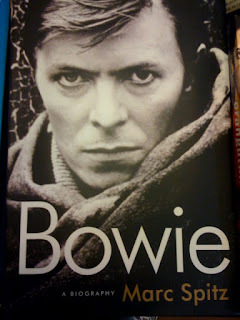(To make things interesting though, I opted to post this cover version by Cursive off of the How Soon Is Now tribute album)
A New Birthday Tradition
5 years ago
Moonlighting as a journalist and writer in Calgary, but mostly just listening to music, watching movies, reading books, and drinking espresso while tracking the various things I've done in an effort to get other things done.
.jpg)
.jpg) I saw this at the bookstore today, and it was almost enough cause for me to break my personal ban on buying new books. I still my circumvent this by buying it for my wife, who is a much more "intense" fan of David Bowie than I am, referring to this cover shot as being of "the sexy David Bowie." Oddly, there have been quite a few women in my life, whose first introduction to Bowie came through the movie Labrynth, and share this opinion. In fact, as far back as high school, a former flame of mine referred to Bowie's presence in the film as "sexy, before you even knew what sex was."
I saw this at the bookstore today, and it was almost enough cause for me to break my personal ban on buying new books. I still my circumvent this by buying it for my wife, who is a much more "intense" fan of David Bowie than I am, referring to this cover shot as being of "the sexy David Bowie." Oddly, there have been quite a few women in my life, whose first introduction to Bowie came through the movie Labrynth, and share this opinion. In fact, as far back as high school, a former flame of mine referred to Bowie's presence in the film as "sexy, before you even knew what sex was." My wife knits. A lot. Lately she's been getting some packages in the mail from a certain Woolgirl. These packages are based on a particular theme and often come with extras. Her most recent kit was based on the Cowardly Lion and it came with this lovely little notebook that my wife gave to me. It's great and I especially like that it has the word "Courage" written on the back. I'm not sure what kind of writing project I'll use it for, but that'll be half the fun.
My wife knits. A lot. Lately she's been getting some packages in the mail from a certain Woolgirl. These packages are based on a particular theme and often come with extras. Her most recent kit was based on the Cowardly Lion and it came with this lovely little notebook that my wife gave to me. It's great and I especially like that it has the word "Courage" written on the back. I'm not sure what kind of writing project I'll use it for, but that'll be half the fun.